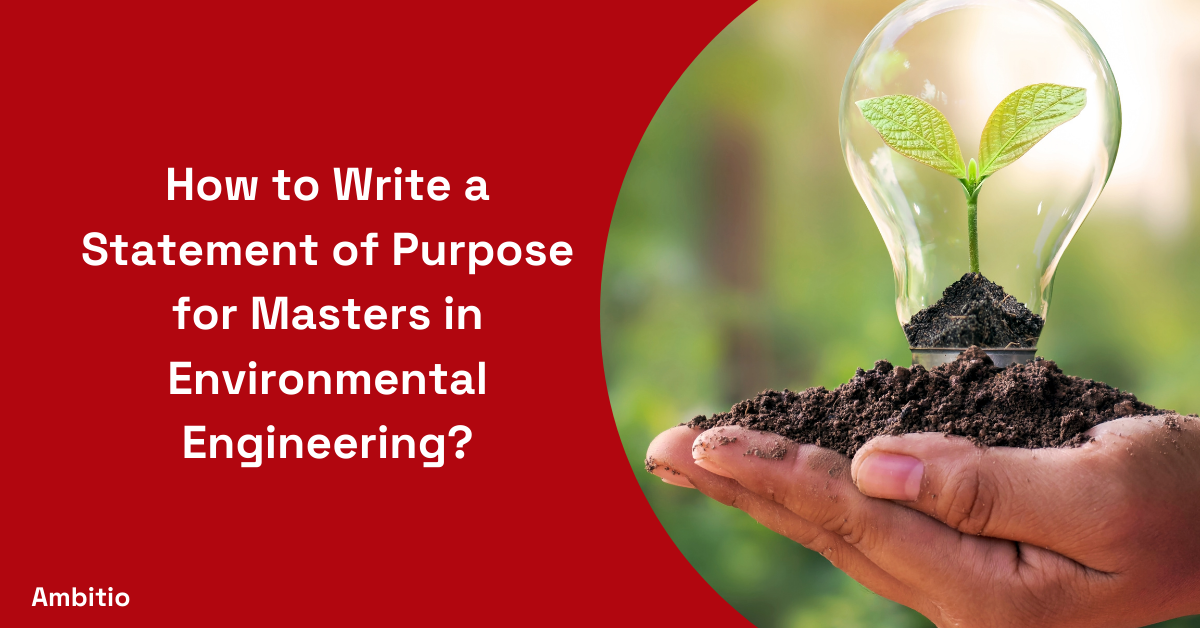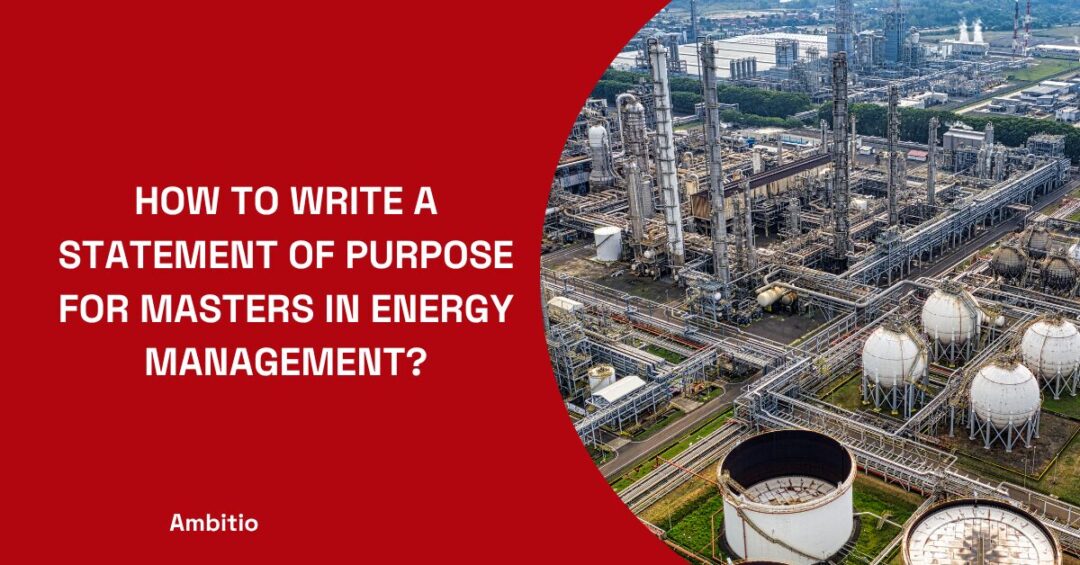24 April 2025
7 minutes read
How to Write a Statement of Purpose for Masters in Environmental Engineering (Sample SOP for Indian Students)?

Key Takeaways
- Statement of purpose for masters in environmental engineering should clearly align your academic background with your sustainability-driven career goals.
- Statement of purpose for masters in environmental engineering must showcase research interests like transport of subsurface contaminants and sustainable solutions.
- Statement of purpose for masters in environmental engineering benefits from concrete examples, concise structure, and a strong conclusion for lasting impact.
A statement of purpose is among the most important parts of your graduate school application. It provides a glimpse into your academic history, work experience, and future career aspirations. This paper allows the admission committee to assess your motivation, preparedness for graduate study, and fit with the environmental engineering program provided by the engineering department at the university.
In a sense, it is like a narrative CV, emphasizing your academic record, internship experience, and your passion for addressing real-world environmental problems. To compose an SOP in environmental engineering, you must ensure that it is clear, do not use too many complex sentences, and use specific examples.
What is the Environmental Engineering Domain?
Environmental engineering is an interdisciplinary practice that integrates concepts of civil engineering, environmental science, and ecology to create environmentally friendly solutions to problems such as solid waste management, groundwater flow and quality, and cleanup of contaminated groundwater.

Fun Fact: Do you know that ancient Rome had sophisticated water and sewage systems that today’s engineers still learn from? Their crude concept of engineering design made them less likely to spread diseases—one of the first examples of environmental management.
The following are some major topics and areas of concern in environmental engineering:
| Topic | Description |
|---|---|
| Groundwater Contamination | Concentrates on subsurface contaminant transport processes. |
| Microbial Processes | Examines microbes for in situ treatment and remediation processes. |
| Diffuse Source Contamination | Examines widespread contamination due to agricultural or urban runoff. |
| Fate and Transport of Subsurface | Studies the movement of contaminants below the ground. |
| Chemical Hydrogeology | Examines chemical interactions in groundwater systems. |
These topics are commonly addressed through applied research projects, internships at the national laboratories, and collaboration with individual faculty members within the department of civil and environmental engineering.
What Makes a Strong SOP for Environmental Engineering and Civil Engineering?
The goal of a strong SOP is to convey your decision to pursue a master’s degree in a way that is both concise and compelling. Your environmental engineering SOP should articulate your past experience, explain your research interests, and map out your long-term goal of contributing to sustainable engineering.
When preparing to write a statement of purpose, include the following:
- A brief overview of your undergraduate degree in civil engineering or related field
- Your academic and professional achievements
- Your research projects or thesis, if applicable
- Industrial training skills acquired in petrochemical or manufacturing processes
- Graduate study and research interest
- Why you are interested in studying a specific program
- Your professional aspirations in infrastructure development or environmental policy
Sample Statement of Purpose / Personal Statement Structure
How to write a solid statement of purpose or personal statement begins with becoming familiar with its fundamental framework—the blueprint not just represents your undergraduate and professional course but also embodies your vision of graduate school.

Prior to exploring a template statement of purpose, the following is a general outline that many top schools would suggest:
| Section | Purpose |
| Introduction | Establish motivation and decision to pursue a master’s degree |
| Academic Background | Discuss course work, academic goals, and achievements |
| Professional Experience | Highlight internship, jobs, or applied research projects |
| Research Interests | Align with specific faculty and environmental engineering topics |
| Why This Program? | Demonstrate fit with the graduate and master’s curriculum |
| Conclusion | Reiterate goal of pursuing graduate studies and future plans |
Statement of Purpose Sample for Environmental Engineering
This example statement of purpose is a student’s academic experience, research interests, and motivation to apply for a master’s in environmental engineering, showing how they intend to develop their skills and contribute to practical solutions.
Sample Statement of Purpose
I am applying for a master’s in environmental engineering with the intention of advancing my knowledge in environmental engineering and positioning my career in sustainable global development goals. Upon graduating with a degree in civil engineering, I was compelled by a strong leaning to managing environmental issues, especially through the framework of engineering systems and policy formulation. My aim is to enhance current environmental infrastructure while making contributions towards research aimed at practical solutions to contemporary environmental issues.
During the last few years, I have developed practical experience through an internship at a wastewater treatment plant and a summer research program in which I helped model groundwater systems. Through these experiences, my interest in the transport of subsurface pollutants and the remediation of impacted water bodies was sparked. I now want to further develop my knowledge in these fields through graduate coursework and team-based research.
In order to sharpen my theoretical and practical skills, I intend to pursue research that facilitates the application of sustainable solutions, especially those involving water purification, chemical hydrogeology, and situ treatment methods. I am particularly interested in the university’s environmental engineering department due to its innovative research in underground contaminant transport processes and its focus on combining environmental sciences with engineering practice.
An M.S. degree will give me the discipline of academic training and research opportunities to become a successful graduate from a highly esteemed program. My long-term vision is to pursue a Ph.D. in environmental engineering and be involved in academia while collaborating with national laboratories and think tanks to shape environmental policy. I am confident that the blend of technical education and interdiscipline exposure provided by your graduate course will enable me to sharpen my skills and fulfill my academic and professional aspirations.
I have invested time in learning how to write an effective and well-organized statement of purpose, knowing that this is not only a formal requirement but also a valuable opportunity to think through my reasons, abilities, and aspirations. I am sure that my education, passion, and study interests qualify me as a good fit for the M.S. program in environmental engineering, and I look forward to being considered to contribute significantly to the academic community at your university.
What are the Requirements for Graduate Programs and Master’s Programs in Environmental Engineering?
Each graduate degree is different. But the essentials are the same.
Standardized Tests Accepted:
- GRE: Widely accepted in the US
- TOEFL, IELTS: For non-native English speakers
- GMAT, ACT, SAT: Accepted for interdisciplinary or dual programs
Key Admission Components:
- Academic transcripts from undergraduate and master’s (if applicable)
- Letter of recommendation
- A well-written personal statement or statement of purpose sample
- Resume/CV
- Application fees and online form
How to Pick the Right Program?
Selecting the best program to pursue a master’s degree entails assessing the department’s faculty, research projects already underway, and the compatibility of the master’s programs with your goals.

Here are factors to consider:
- Environmental policy or science integration programs
- Availability of studying environmental engineering and ecology jointly
- Strong graduate study and research clusters
- Location benefits in close proximity to petrochemical industries or areas of infrastructure development
Top Universities for a Master’s Degree in Environmental Engineering
The right university or college for a master’s degree in environmental engineering can significantly shape your future in sustainable innovation, offering access to world-class faculty, cutting-edge labs, and real-world research opportunities.
Given below is a table for your reference:
| University or College | Country | Estimated Annual Tuition (USD) | Notable Highlights |
|---|---|---|---|
| Massachusetts Institute of Technology (MIT) | USA | $57,590 | Renowned for applied research and sustainable design |
| Stanford University | USA | $59,790 | Emphasis on environmental policy and water systems |
| University of California, Berkeley | USA | $45,000 | Known for research in groundwater quality and flow |
| Georgia Institute of Technology | USA | $29,140 | Offers specialization in solid waste management |
| University of Cambridge | UK | $40,300 | Focus on environmental change and policy |
| Imperial College London | UK | $43,800 | Strong in chemical hydrogeology and microbial processes |
| University of Oxford | UK | $39,200 | Offers interdisciplinary coursework and research |
| University of Toronto | Canada | $32,000 | Leading research in remediation of contaminated groundwater |
| University of British Columbia (UBC) | Canada | $28,800 | Expertise in subterranean contaminant transport |
| McGill University | Canada | $26,500 | Offers robust programs in civil and environmental engineering |
Final Tips on How to Write an SOP
Crafting an impactful SOP for environmental engineering requires intentional storytelling and clear examples.
Use these tips:
- Avoid generalities; use concrete examples from your academic or professional life
- Show curiosity and depth in environmental engineering topics
- Don’t just list achievements; reflect on how they shaped your decision to pursue the field
- Showcase knowledge and understanding of current environmental challenges
- Align your goals with what the graduate program offers
Conclusion
A clearly written statement of purpose connects your past experience to future goals in environmental engineering. It informs the admission committee that you are not only qualified academically but highly motivated to contribute to areas such as environmental policy, solid waste management, and groundwater remediation. By tapping into your educational history, emphasizing your research interests, and stating your intent to continue studying in a clear manner, you can market yourself as a strong graduate student for any highly competitive environmental engineering program.
Whatever your ultimate aspiration is – Ph.D., business leadership, or influencing environmental policy – your SOP can be that golden key. So relax, learn about your particular research areas of interest, and write a solid SOP reflecting your individual trajectory.
For the best study abroad guidance, choose Ambitio and make your dreams come true!
FAQs
What should be included in a statement of purpose for masters in environmental engineering?
A strong statement of purpose for masters in environmental engineering should include your academic background, research interests, and career goals. Your statement of purpose for masters in environmental engineering must also reflect your motivation for choosing this field.
How long should a statement of purpose for masters in environmental engineering be?
The ideal length of a statement of purpose for masters in environmental engineering is 500 to 1,000 words. This allows your statement of purpose for masters in environmental engineering to remain concise while covering all essential details.
Can I mention internships in my statement of purpose for masters in environmental engineering?
Yes, mentioning internships in your statement of purpose for masters in environmental engineering helps demonstrate real-world exposure and practical experience.
Is work experience necessary for writing a strong statement of purpose for masters in environmental engineering?
While not mandatory, including work experience in your statement of purpose for masters in environmental engineering can strengthen your application by showing applied knowledge.
Should I tailor each statement of purpose for masters in environmental engineering to different universities?
Absolutely. Tailoring your statement of purpose for masters in environmental engineering to highlight specific faculty, research centers, or program features is highly recommended.
Can I use a sample when drafting my statement of purpose for masters in environmental engineering?
Yes, reviewing a sample can provide structure and inspiration, but your statement of purpose for masters in environmental engineering should reflect your unique goals and voice.
Do top universities emphasize a strong statement of purpose for masters in environmental engineering?
Yes, top universities consider a strong statement of purpose for masters in environmental engineering as a key element in evaluating your readiness and fit for the program.

You can study at top universities worldwide!
Get expert tips and tricks to get into top universities with a free expert session.
Book Your Free 30-Minute Session Now! Book a call now




























